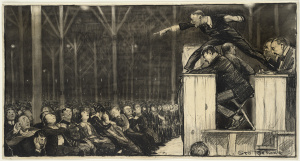Monthly Archives: July 2018
Abortion: There is No Ethical Dilemma
Carl Sagan said this decades ago. I think my friend John Zande actually says it better. If the end of brain activity is the end of an individual’s life, then before there is coherent brain activity, individual life has not yet begun.
 How can you “kill” something that cannot “die”?
How can you “kill” something that cannot “die”?
This is arguably the most significant question in any discussion concerning the legality of abortion, and because facts matter, the following seventeen words are critical in understanding that before gestational week 25, although more accurately week 28, there is no ethical dilemma in terminating a pregnancy because nothing is being killed—or worse, to use the careless language of some, murdered.
At no stage does life magically appear in a zygote, a blastocyst, an embryo, or a foetus.
Life began on earth 3.8 billion years ago and has not been interrupted since. There is no ‘divine spark,’ no ensorcelled moment when the inanimate abruptly transforms into the animate. A foetus was never inorganic and suddenly becomes organic. The egg and the sperm are already parts of the living system—a 3.8 billion years old system driven by chemiosmosis, where the rechargeable…
View original post 893 more words
The Scopes “Monkey trial”, Part 2: Evidence, Confrontation, Resolution, Consequences
This weekend sees the 93rd anniversary of the Scopes Trial, and I am reposting this and its companion piece to celebrate.
I would point out two things. One is that the actual William Jennings Bryan was nothing like the ogre of Inherit the Wind, which was an allegory of McCarthyism. The other is how remarkably well the scientific evidence has stood up to almost a century of examination. There is even a mention, based on serological evidence, of how closely related whales are to hoofed land animals.
Darrow: Did you ever discover where Cain got his wife?
Bryan: No, sir; I leave the agnostics to hunt for her.
Both sides, I will argue, were long-term loses in this exchange. But why were such matters being discussed in Tennessee court of law in the first place?
Part 1: the story so far: An extraordinary case indeed, where a school teacher, with the encouragement of his own superintendent, volunteers to go on trial in the State court for the crime of teaching from the State’s approved textbook, and where that same superintendent will be the first witness called against him. And where a mere misdemeanour case, with a maximum penalty of $500, could attract the participation of William Jennings Bryan, former US Secretary of State, and Clarence Darrow, America’s most famous trial lawyer and an agnostic.
In the run-up to the case, we even have the…
View original post 4,796 more words
The Scopes “Monkey trial”, Part 1: Issues, Fact, and Fiction
This weekend sees the 93rd anniversary of the Scopes Trial, and I am reposting this and its companion piece to celebrate.
I would point out two things. One is that the actual William Jennings Bryan was nothing like the ogre of Inherit the Wind, which was an allegory of McCarthyism. The other is how remarkably well the scientific evidence has stood up to almost a century of examination. There is even a mention, based on serological evidence, of how closely related whales are to hoofed land animals.
What is the purpose of this examination?
We have the purpose of preventing bigots and ignoramuses from controlling the education of the United States, and that is all.
Inherit the Wind, the prism through which the public sees the Scopes Trial, is a travesty. William Jennings Bryan, who prosecuted Scopes, was neither a buffoon nor a biblical literalist but moved by deep concerns that continue to merit attention. He did not protest at the leniency of Scopes’s punishment, but offered to pay the fine out of his own pocket. Nor did he collapse in defeat at the end of the trial, but drove hundreds of miles, and delivered two major speeches, before dying in his sleep a week later. Scopes, on trial for the crime of teaching evolution in Tennessee state school, was never at risk of prison. He was no martyr, but a willing participant…
View original post 4,086 more words
Can we trust radiocarbon dating?
Can we trust radiocarbon dating? Young Earth creationists tell us that we can’t. After all, it makes the same range of assumptions as other radiometric dating methods, and then some. Other methods benefit from internal checks or duplications, which in the case of radiocarbon dating are generally absent. There are numerous cases where it appears to give absurdly old ages for young material, while apparent ages of a few tens of thousands of years are regularly reported for material known on other evidence to be millions of years old. So can the Young Earth creationist1 objections be rebutted, and if so how?
The principle of radiometric dating is simple.2 If we know how much of a particular radioactive substance was present when a material formed, how much is still there, and Read the rest of this entry

